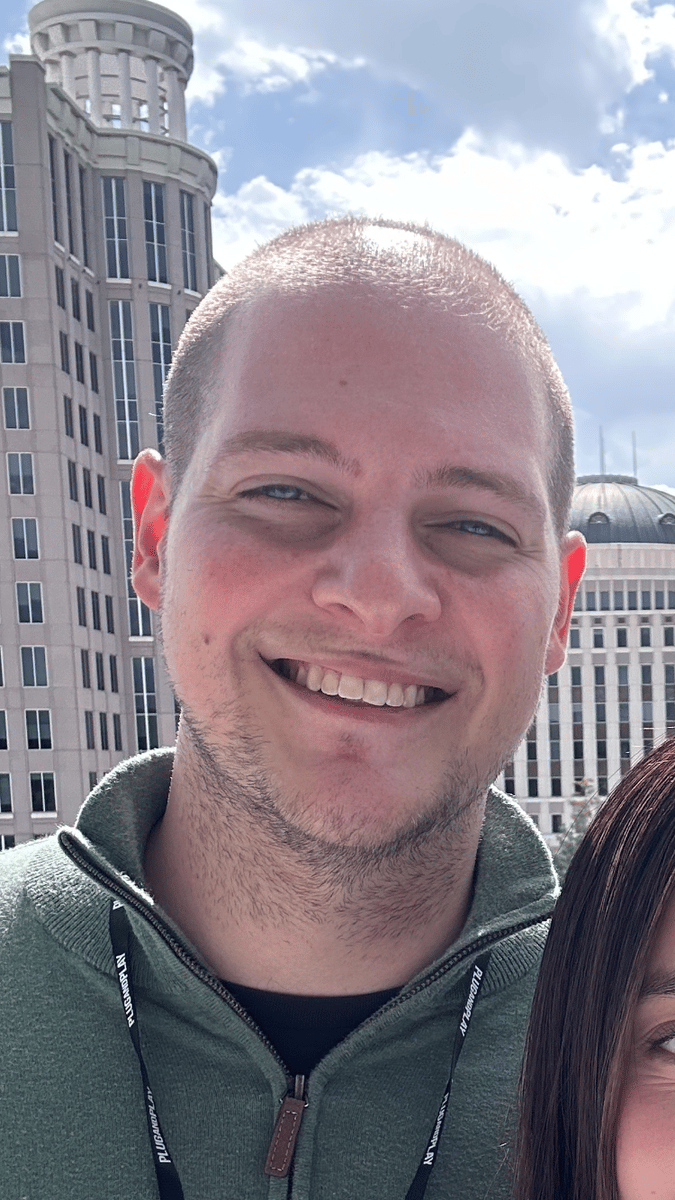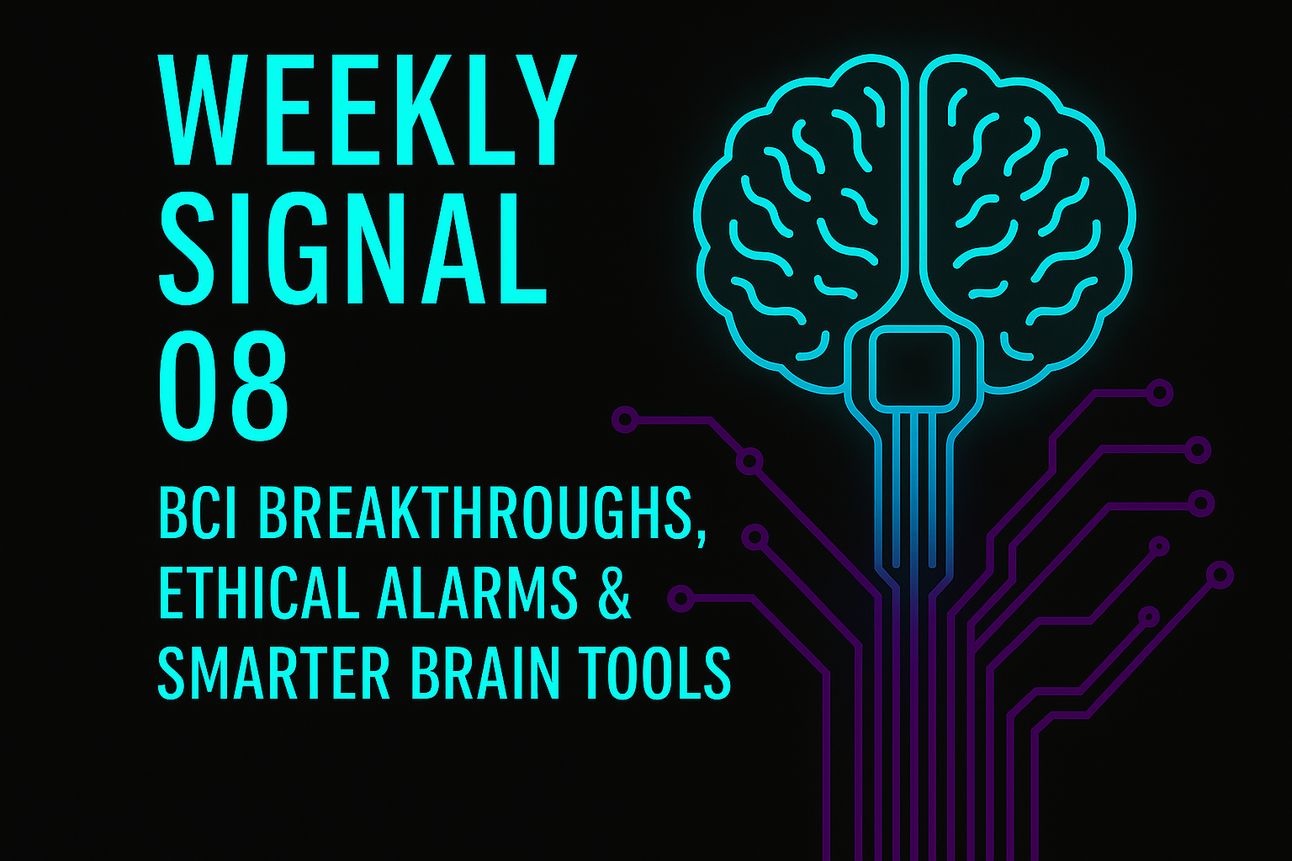Table of Contents
🧠 Weekly Signal
neurotechnology. Every week, we handpick the most impactful stories shaping the future of brain science, neuroengineering, and cognitive technology. Whether you're a researcher, enthusiast, or industry professional, Weekly Signal keeps you connected to the pulse of the neurotech world.
Let's cut through the noise this week!
🧠 Neuralink Begins UAE-PRIME Brain Computer Interface Trial in Abu Dhabi
Published: May 15, 2025
Source: UAE Embassy / Economy Middle East
Neuralink, founded by Elon Musk, has initiated its first international clinical trial, dubbed UAE-PRIME, at Cleveland Clinic Abu Dhabi. This study aims to evaluate the efficacy of Neuralink’s brain-computer interface (BCI) technology in individuals with motor and speech impairments.
🔑 Key People:
Elon Musk - CEO of Neuralink
🔹 Why it matters:
This trial signifies Neuralink’s expansion into global markets and its commitment to developing BCI solutions for neurological conditions such as paralysis and ALS.
🔹 Big picture:
The collaboration with Cleveland Clinic Abu Dhabi the Middle East’s growing role in cutting edge medical research and the global interest in neurotechnology applications.
💡 Mind-controlled devices are transitioning from science fiction to clinical reality, offering new hope for individuals with severe neurological impairments.
👉 Your Take:
How do you feel about Neuralink launching clinical trials in Abu Dhabi?
🔍 Precision Neuroscience Receives FDA Clearance for Layer 7 Cortical Interface
Published: May 17, 2025
Source: Bloomberg
Precision Neuroscience — co-founded by former Neuralink brain surgeon Dr. Benjamin Rapoport — has received FDA clearance for its Layer 7 Cortical Interface, a hair-thin film implanted on the surface of the brain. Unlike Neuralink's approach, which penetrates brain tissue, this flexible strip sits on top, enabling less invasive interaction with brain activity.
The device was temporarily implanted in Tim Fisher, a Parkinson’s patient, during surgery in Philadelphia. When Fisher moved his left hand, a nearby robotic arm mimicked the motion, powered by his neural signals.
🔑 Key People:
Dr. Benjamin Rapoport – Co-founder, Precision Neuroscience (former Neuralink co-founder)
Michael Mager – CEO, Precision Neuroscience
🔹 Why it matters:
The FDA clearance allows the device to be used for up to 30 days to record, monitor, and stimulate brain activity. This paves the way for more accessible, reversible brain-computer interface systems — and offers a powerful tool for surgeons and researchers.
🔹 Backstory:
With 1,024 tiny electrodes and a minimally invasive design, Precision’s implant could transform how we map, interpret, and one day interact with the brain. It’s a milestone in making safe, short-term BCIs practical in hospitals and research labs.
💡 Not all brain implants need to go deep — Precision’s approach proves surface-level can still mean cutting-edge.
👉 Your Take:
Precision’s new brain implant avoids penetrating tissue. What’s your take?
📱 Neurocast.ai Completes FDA Device Registration for Brain Health Platform
Published: May 19, 2025
Source: Newsfile
Neurocast.ai has successfully completed FDA device registration for its brain health platform, paving the way for its launch in the U.S. market. The platform aims to monitor and support brain health, potentially aiding in the management of conditions like brain fog and memory loss.
🔹 Why it matters:
FDA registration validates the platform's safety and efficacy, enabling broader access to tools that support cognitive health.
🔹 Backstory:
This milestone aligns with the increasing demand for digital health solutions that empower individuals to monitor and enhance their neurological well-being.
💡 Surface-level brain interfaces may provide safer alternatives for patients requiring neural monitoring or stimulation.
👉 Your Take:
Would you use an app to monitor your brain’s health?
🧬 AI-Guided Gene Vectors Enable Precise Targeting of Brain and Spinal Cells
Published: April 18, 2025
Source: NIH News
Researchers funded by the NIH have developed a new toolkit of adeno-associated virus (AAV) vectors that utilize artificial intelligence to deliver genes to specific brain and spinal cord cell types with high precision. This innovation holds promise for treating neurological disorders by enabling targeted gene therapy.
🔹 Why it matters:
The ability to precisely target specific neural cells opens new avenues for treating conditions like ALS, epilepsy, and Parkinson's disease without the need for invasive procedures.
🔹 Backstory:
This advancement represents a significant step toward personalized medicine in neurology, where treatments can be tailored to the individual's unique neural architecture.
💡 AI-driven gene therapy could revolutionize personalized medicine for neurological conditions.
👉 Your Take:
AI is guiding gene delivery to specific brain cells. How do you feel about this?
🧰 Terumo Neuro Launches SOFIA 88 Neurovascular Support Catheter in the U.S.
Published: May 13, 2025
Source: Terumo Neuro
Terumo Neuro has announced the U.S. commercial availability of the SOFIA 88 neurovascular support catheter. Designed for use in neurovascular procedures, the catheter offers enhanced flexibility and a larger inner diameter to improve access and precision during interventions.
🔹 Why it matters:
The SOFIA 88 catheter's design improvements can lead to better outcomes in procedures such as stroke treatment, where timely and precise intervention is critical.
🔹 Backstory:
This launch reflects ongoing innovation in neurovascular tools, aiming to enhance the effectiveness and safety of minimally invasive neurological procedures.
💡 Advancements in catheter technology are crucial for improving patient outcomes in neurovascular interventions.
👉 Your Take:
Terumo’s catheter aims to improve stroke care. What’s your perspective?
🧬 Sanofi Acquires Vigil Neuroscience to Strengthen Alzheimer's Pipeline
Published: May 21, 2025
Source: Reuters
Sanofi has entered into an agreement to acquire Vigil Neuroscience for approximately $470 million, aiming to bolster its neurology-focused pipeline with an investigational Alzheimer's treatment, VG-3927. This compound is designed to activate TREM2, a protein linked to brain immune cells, potentially preventing neural degeneration.
🔹 Why it matters:
The acquisition underscores the pharmaceutical industry's commitment to developing innovative treatments for Alzheimer's disease, a condition with significant unmet medical needs.
🔹 Backstory:
Sanofi's investment in Vigil Neuroscience highlights the strategic importance of neurodegenerative disease research and the potential of novel therapeutic targets like TREM2 in addressing these complex conditions.
💡 Targeting immune pathways in the brain offers a new frontier in Alzheimer's therapy development
👉 Your Take:
Sanofi just bought a company working on Alzheimer’s therapies. What do you think?
🧬 Ethical Considerations in Neurotechnology Highlighted in Recent Analysis
Published: May 16, 2025
Source: Medium
An article by Pavan on Medium delves into the ethical implications of advancing neurotechnology, particularly brain-computer interfaces. The piece raises concerns about privacy, consent, and the potential for misuse of neural data, emphasizing the need for robust ethical frameworks as the field progresses.
🔹 Why it matters:
As neurotechnology becomes more integrated into daily life, addressing ethical considerations is crucial to ensure that advancements benefit society without compromising individual rights.
🔹 Backstory:
This analysis contributes to the ongoing discourse on neuroethics, advocating for proactive measures to safeguard mental privacy and autonomy in the face of rapid technological development.
💡 Ethical foresight is essential to navigate the challenges posed by emerging neurotechnologies.
👉 Your Take:
Do brain-computer interfaces risk our mental privacy?
⚡ Innovator Spotlight
In our Innovator Spotlight, we celebrate members of The NeuroCircuit community who are pushing the boundaries of neurotechnology. Each week, we feature a subscriber who has successfully completed our latest Community Challenge. Their innovative approach and dedication exemplify the spirit of collaboration and discovery that drives our community forward.
🛠️ Neurohack Nexus: Live Neurotech Project Repository
The Neurohack Nexus is a continuously updated, open‑source library of neurotechnology projects—complete with code, schematics, step‑by‑step tutorials, and community contributions. Whether you’re a beginner tinkering with your first EEG hack or an advanced builder crafting custom BCI extensions, the Nexus brings together the resources and collaborative spirit you need to learn, build, and innovate.
How useful would you find the Neurohack Nexus?
📚 Reading Corner (2025)
Curious minds, this one’s for you. Whether you're exploring the mechanics of BCIs, diving into neural engineering, or reflecting on the ethical frontiers of brain science—our curated list of neurotech reads has you covered.
But we’re just getting started—help us expand the list!
👉 What books would you recommend? Share your top picks in our 1-click survey and help shape the future of the NeuroCircuit library.
🎓Academic Resources
Whether you're applying for a master’s in neuroengineering, seeking PhD programs with BCI research, or hunting for summer research internships, our academic resources are your go-to launchpad.
We’re curating a growing list of academic programs, research fellowships, and internship opportunities around the globe. And we’d love your help!
📢 Know a great program, lab, or opportunity?
Share it with the community using our short-survey below 👇
📅 Upcoming Events (2025)
Stay informed about upcoming neurotech conferences and networking opportunities around the world:
Cognitive Neuroscience Society (CNS) 2025 Annual Meeting
📍 Boston, Massachusetts, USA | March 29–April 1, 2025
NeurotechEU Symposium 2025
📍 Bonn, Germany | May 13, 2025
Neural Interfaces 2025
📍 Arlington, Virginia, USA | June 12–14, 2025
2025 Neurotech Leaders Forum
📍 Location TBA | November 5–6, 2025
Society for Neuroscience 2025 Annual Meeting
📍 San Diego, California, USA | November 15–19, 2025
Maudsley Neurotechnology Conference 2025
📍 King's College London, UK | Dates TBA
Conference on Neural Information Processing Systems (NeurIPS) 2025
📍 San Diego, California, USA | December 2025
🎯 Community Challenge
Ready to take neurotech to the next level? Share your insights, projects, ideas, our upcoming list of NeuroHacks, or your own groundbreaking work—and watch the inspiration ripple across the community!
How to Participate
Create a Post
Show us what you’re working on—DIY projects, research breakthroughs, or even your latest neurotech musings.Use #NeuroCircuitChallenge
This helps your ideas reach fellow enthusiasts and potential collaborators.Tag @HackTheNeuron
Tag us directly in your post so we never miss your entry—and we’ll amplify your work across our entire NeuroCircuit community!
Why Join?
Boost Your Reach: Tap into a niche but fast-growing community for extra visibility.
Build Your Network: Connect with researchers, developers, and curious tinkerers who share your passion.
Shape Neurotech’s Future: Your project or insight could spark the next big breakthrough—or inspire someone else’s.
We can’t wait to see your creativity in action! Fire up X, LinkedIn, Facebook, Instagram, or TikTok, and spread the word. Let’s spark innovation together!
🚀Recruit More Neurohackers
Your referrals are the engine that drives our community forward. Share your unique referral link with friends, colleagues, or fellow neurotech enthusiasts—and watch us grow together!
Spread the Word: Copy your personal referral link and post it on social, forums, or in emails.
Unlock Exclusive Perks: Every friend who subscribes through your link brings you closer to special rewards—insider insights, private Discord access, early project previews, and more.
Be the Catalyst: The more you share, the stronger our network becomes. Help us build the ultimate neurotech hub—one referral at a time!
✍️Help Us Improve
Your input is what will make The NeuroCircuit and Hack The Neuron better. Let us know what you’d like more of—and what we can do differently.
Share Your Ideas: Tell us which topics, features, or formats you’d love to see next.
Spot the Gaps: Let us know if anything’s missing or unclear in our content and community tools.
Shape the Experience: Whether it’s new challenges, tutorials, or platform features, your suggestions guide our roadmap.


